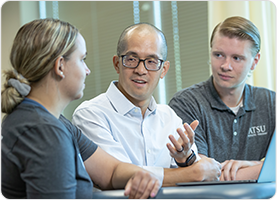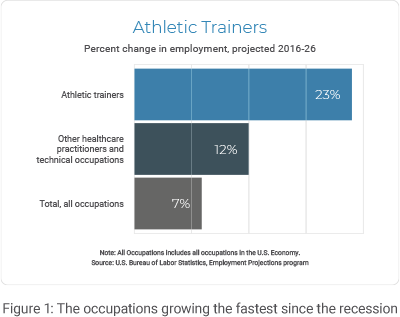Pathways to leadership through the athletic training education continuum
Download Whitepaper
As the athletic training profession experiences growth and change, opportunities for advancement are also expanding. Finding the best athletic training career advancement pathway in clinical practice, education, research, and industry leadership is a discovery process. A pivotal part of this process is matching the required curriculum models to professional goals with the right program tracks and concentrations.
The situation
The growing and evolving athletic training profession requires more thought leaders to push the envelope, and flexible pathways in post-professional education to help them develop their specialized leadership potential. For many, this may reveal the educator that lies within.
By 2022, accredited athletic training programs will begin at the master’s degree level, in accordance with the 2020 Standards from the Commission on Accreditation of Athletic Training Education (CAATE).2
Combine that with the growing number of individuals choosing to enter the athletic training profession (sources: BLS and CareerBuilder), and the question becomes, “Who will teach them?” The answer becomes clear: More educators are needed. Available data indicates only about four percent of athletic trainers currently hold a doctoral degree (2,040 people).
Finding the best athletic training career advancement pathway in clinical practice, education, and industry leadership is a discovery process and requires that curriculum models be matched to professional goals with the right program tracks and concentrations.
The solution
Athletic trainers who elevate their standing in the profession with a doctoral degree in athletic training create new opportunities to expand and enhance the delivery of athletic healthcare and to improve the health outcomes of physically active individuals and their communities.
For athletic training professionals who want to align their passion points and areas of interest to their post-professional education, a distinctive education model offering elective tracks can be the pathway to help them do just that.
These elective tracks empower graduates with advanced professional degrees to elevate their standing as educators and leaders within the industry, or focus on their integrated areas of expertise within clinical practice.
“Given that new 2020 accreditation standards are going to require additional faculty for many programs and that all faculty exhibit ‘contemporary expertise’ and ‘scholarship,’ the Doctor of Athletic Training program is perfectly positioned to meet their needs,” says Eric Sauers, PhD, ATC, FNATA, professor & chair, Department of Interdisciplinary Health Sciences at A.T. Still University and associate director of the Athletic Training Practice-Based Research Network. “They must also now teach the core competencies of quality improvement, health informatics, evidence-based practice, and patient-centered care. The doctor of athletic training degree perfectly positions faculty to develop ‘contemporary expertise’ in these new areas required of all programs.”
Finding the right pathway
Considering the many educational opportunities in the athletic training profession, how does one go about aligning their interests with the right pathway? Identifying the appropriate graduate degree curriculum and elective tracks is the key to finding the academic and professional advancement track best suited for them.
Area(s) of interest:
- Clinical application
- Leadership
- Orthopaedics
- Rehabilitation
- Administration
- Education
- Sport neurology/concussion research
Athletic Training (AT) elective tracks:
- Clinical decision-making: Demonstrate advanced clinical decision-making to determine the effectiveness of athletic training practice.
- Orthopaedics: Demonstrate advanced practice athletic training knowledge and skills in the specialty area of orthopaedics.
- Rehabilitation: Demonstrate advanced practice athletic training knowledge and skills in the specialty area of rehabilitation.
- Athletic training education: Debate and apply contemporary knowledge and skills in athletic training leadership.
- Sport neurology and concussion: Demonstrate advanced practice athletic training knowledge and skills in the sub-specialty area of sports neurology and concussion.
For athletic training professionals who enter a doctorate of athletic training program that builds a degree with elective tracks, they can apply course content immediately to their educational and/or clinical practice, thus benefiting both themselves and their students/patients. Doctoral students progress through content in a sequential manner, engage in discussions with peers and faculty, and complete a variety of assignments to enhance their learning:
- Graduate certificate: Obtain a graduate certificate and microcredential to demonstrate your expertise in the content area. Then, if you decide to later obtain your doctorate, this certificate will provide for advance standing.
 Educational pathways and professional opportunities |
 Configure your doctorate in athletic training |
 View AT student, faculty, and alumni videos |
Advancement opportunities
Change is imminent. The athletic training profession is evolving to become more integrally linked to the inter-professional healthcare team, and to meet growing demand.
According to the Bureau of Labor Statistics, “Employment of athletic trainers is projected to grow 23 percent from 2016 to 2026, much faster than the average for all occupations. Demand for athletic trainers is expected to increase as people become more aware of the effects of sports-related injuries, and as the middle-aged and older population remains active.”
 Add to that the CareerBuilder data in a March 2018 Forbes magazine article which states, “Athletic Training has experienced some of the fastest growth since the recession.”3 (See Figure 1)
Add to that the CareerBuilder data in a March 2018 Forbes magazine article which states, “Athletic Training has experienced some of the fastest growth since the recession.”3 (See Figure 1)
Helping athletic trainers find the right fit is crucial as the profession continues to grow. Choices in athletic training education pathways not only provide opportunities for professionals to find their academic and professional fit, but advance their career path in an array of areas.
Students with a doctorate in athletic training are practicing athletic trainers who want to advance to the forefront of their careers in many exciting areas of healthcare, including:
- Elite-level athletic trainer
- Head athletic trainer
- Clinical preceptor
- Director of athletic training services
- Clinical education coordinator
With a doctorate in athletic training, graduates serve as expert educators, clinicians, and administrators with advanced knowledge and skills for analyzing, developing, and implementing practical solutions to improve the delivery of athletic healthcare and health outcomes of physically active individuals and their communities.
Education pathways and professional opportunities
Graduate certificate programs +
-
Specialty knowledge athletic trainer
The following represents the broad continuum of the most likely real-world outcomes for athletic training professionals correlating to each type of athletic training education, once completed.4
-
Professional bachelor’s or master’s program +
-
Generalist athletic trainer
- Athletic trainers within university settings
- Bachelor’s level AT teachers
- Athletic trainers within military and government positions
- Athletic trainers working in K-12 settings
- Athletic trainers working within medical practices
- Athletic trainers working in clinic and hospital settings
-
Post-professional master’s program +
-
Advanced generalist or specialist athletic trainer
- Athletic trainers within university settings
- Bachelor’s level AT teachers
- Athletic trainers within military and government positions
- Athletic trainers working in K-12 settings
- Athletic trainers working within medical practices
- Athletic trainers working in clinic and hospital settings
-
Residency AT program +
-
Advanced practice leadership athletic trainer
- Clinical professionals who desire to lead and further AT practice in the field
- AT professors teaching from the perspective of a terminal clinical degree
- Advanced research: Master’s students within the industry who would like to research as their next step professionally
- Clinical practice-based research for the industry
- Government or military leadership
- ATs for professional sports teams
- ATs working in physician practices
- Leadership in clinical hospital settings
-
Advance practice doctorate program (DAT) +
-
Professional scholar athletic trainer
- Lab research positions in university settings furthering AT knowledge base
- Lab research within the industry
- Professors teaching from the perspective of a terminal research degree
- Master’s students within the industry who would like to research as their next step professionally
- Research positions within a hospital setting
- Research positions within medical practices
-
Lifelong learning
Advancing the practice and teaching of athletic training involves lifelong learning, well beyond graduation with a doctorate. Continual learning involves applying new concepts, skills, and ideas to enhance professional development, no matter where professionals are in their educational and professional journey.
The Athletic Training Practiced Based Research Network (AT-PBRN) at ATSU is an ongoing and highly respected source for clinical outcomes and evidence-base practice education to educate and train post-professional athletic training students.
Taking the pathway to thought leadership involves a continuum of learning in athletic training – learning that evolves athletic training professionals into the leaders and mentors who ultimately enhance the quality of healthcare globally and elevate the stature of athletic trainers in education, clinical practice, and industry leadership.
1 ATSU Athletic Training Department2 Commission on Accreditation of Athletic Training Education (CAATE) 2020 Standards
3 CareerBuilder, Forbes March 2018
4 U.S. Bureau of Labor Statistics
